
Top 9 Marketing Attribution Software Tools & Platforms in 2026
Marketing attribution software tools empower businesses to make data-driven decisions, optimize their marketing efforts, and ultimately enhance overall performance and success. Our blog offers in-depth insights into marketing attribution, guiding businesses about essential tools for strategic success.
Marketing teams are under constant pressure to justify budgets and prove ROI. With businesses increasingly relying on data-driven insights, tools like Marketing Mix Modeling (MMM) and Google Analytics 4 (GA4) are essential for precise attribution. The marketing attribution software market, valued at $3.53 billion in 2023, is projected to reach $9.13 billion by 2030, growing at a CAGR of 14.5%.
In a September 2024 survey, U.S. Chief Marketing Officers (CMOs) reported a 5.8% increase in marketing spend over the past year, with expectations of an 8.6% rise in the next 12 months. This surge highlights the growing demand for marketing attribution solutions that optimize performance, track multi-channel efforts, and refine spending strategies.
Marketing attribution software provides crucial insights for data-driven decision-making, and as typical marketing attribution software solutions evolve, teams now gain clearer visibility into touchpoints that influence conversions. In this blog, we’ll discuss Marketing Attribution, explore the role of Marketing Attribution Software, and examine various attribution models that empower marketers to enhance customer experience and make well-informed decisions. especially when leveraging platforms like Google for campaign analysis.
Key Takeaways
- Choosing the right marketing attribution software and tools helps track customer journeys, optimize ad spend, and improve ROI with data-driven insights.
- Look for platforms with CRM, advertising, and analytics integrations to create a seamless and comprehensive attribution model.
- AI-driven attribution and machine learning insights enhance accuracy by identifying high-impact marketing channels.
- User journey visualization and multi-touch attribution provide deeper insights into customer behavior and decision-making.
- Solutions like DiGGrowth offer specialized attribution capabilities, ensuring precise analytics for revenue-focused marketing strategies.
What Is Marketing Attribution Software + Examples
Marketing attribution is a data-driven methodology that assigns value to each touchpoint in a customer’s journey, helping marketers understand the contribution of individual channels and interactions to the desired outcome. This process enables corporations to identify and prioritize the most effective digital marketing strategies, optimize resource allocation, and make informed decisions based on concrete insights. Many marketing attribution companies provide advanced tools to simplify this process, offering what is marketing attribution software examples such as multi-touch attribution platforms, cross-channel analytics tools, and customer journey visualization systems.
Furthermore, information security plays a crucial role in ensuring that the data used for attribution remains protected throughout the process, safeguarding sensitive customer information and maintaining trust with stakeholders. Multi-channel attribution tools help ensure secure and accurate tracking across all touchpoints. This approach empowers strategic decision-making, offering key benefits:
- Identify high-impact channels for strategic refinement.
- Allocate the budget effectively based on touchpoint performance.
- Prioritize and enhance marketing approaches.
- Gain comprehensive insights into customer journeys.
- Focus efforts on channels with the most significant impact.
Simply put, marketing attribution is not just a data analysis tool; instead, it serves as a strategic guide, directing marketers toward a more effective and efficient path to success by helping them understand the Cost associated with each marketing effort.
The Importance of Marketing Attribution Software and Tools
- Understanding Marketing Impact:
- Clear ROI Measurement:
- Strategic Decision-Making:
- Customer Behavior Analysis:
- Optimized Marketing Strategies:
- Improved Collaboration Between Teams:
Attribution tracking software helps businesses determine which marketing efforts contribute to conversions, ensuring resources are spent effectively.
Without proper attribution, it is difficult to measure the true return on investment of marketing campaigns. Attribution software assigns value to each touchpoint, providing accurate performance insights.
Businesses can make informed choices based on data rather than intuition, leading to more effective marketing strategies.
Marketing attribution companies offer tools that track customer interactions across multiple platforms, helping businesses understand what influences purchasing decisions.
Attribution software helps businesses refine their marketing approach by identifying which channels, content, and campaigns are most effective.
When marketing, sales, and finance teams have access to reliable attribution data, they can work together more effectively to drive revenue growth.
Benefits of Marketing Attribution Software
- Higher Marketing Efficiency:
- Increased Customer Engagement:
- Better Budget Optimization:
- Stronger Competitive Advantage:
- Seamless Multi-Channel Integration:
- Faster and More Accurate Reporting:
- Better Customer Retention:
- Scalability and Growth:
Performance attribution software ensures businesses focus on high-impact campaigns, reducing wasted ad spend and improving efficiency.
By identifying the best-performing touchpoints, businesses can create personalized experiences that drive stronger engagement.
Marketing attribution software allows businesses to allocate their budget more effectively by investing in strategies that generate the best returns.
Companies leveraging attribution tools can outperform competitors by fine-tuning their marketing efforts based on data-driven insights.
Attribution tracking software helps businesses track performance across multiple platforms, ensuring a well-balanced marketing approach.
Automating marketing attribution reduces manual reporting errors and provides real-time insights into campaign performance.
Understanding the customer journey helps improve retention through targeted messaging. Marketing attribution companies provide tools to track and optimize these touchpoints for stronger customer loyalty.
As businesses grow, attribution software helps them scale marketing efforts efficiently by continuously analyzing and optimizing campaigns.
Types of Marketing Attribution Models
- Multi-Touch Attribution (MTA):
- First-Touch Attribution:
- Last-Touch Attribution:
- Linear Attribution:
- Time Decay Attribution:
- First-and-Last Model:
- Marketing Mix Modeling (MMM)
- Offline and Online Channels:
- External Factors:
- Market Conditions:
- Multi-Channel Attribution (MCA)
- Unified Customer Profiles:
- Foot Traffic Analytics:
- Location-Based Tracking:
- Point-of-Sales Integration:
Multi-Touch Attribution (MTA), in its various forms, provides marketers with a practical approach to understanding the collaborative efforts of different touchpoints in driving conversions. These models offer valuable insights, allowing businesses to refine their strategies for optimal impact. Multi-channel attribution tools further enhance this process by tracking and evaluating performance across all touchpoints, ensuring a comprehensive view of the customer journey. Let’s explore the key sub-models:
This model attributes that when a customer decides to buy something, the credit for that decision goes to the first thing they saw or interacted with. It highlights how important it is for customers to know about a product before buying it.
Last-touch attribution gives the most credit to the last thing a customer interacts with before purchasing. It points out the specific channel that played a direct role in sealing the deal.
This model evenly distributes credit across all touchpoints in the customer journey, recognizing each interaction’s contribution, regardless of its position.
Recognizing that interactions closer to the conversion often have more impact, time decay attribution assigns increasing value to touchpoints as they get closer to the conversion event.
The First-and-Last Touch Attribution Model offers a simplified view of attribution, focusing on the starting and ending points of the customer journey. While it might not capture the entire narrative, it provides clear insights into the crucial touchpoints that initiate the journey and bring it to a successful close.
Multi-Touch Attribution (MTA) is a practical tool for marketers seeking to understand the collective impact of various touchpoints in driving conversions.
For example, if a customer discovers a product through a social media ad but only purchases engaging with multiple content pieces. Then, first-touch attribution might overlook the comprehensive journey.
Or if a customer extensively engages with a webinar but briefly clicks on a display ad, then linear attribution would give equal weight to both, potentially undervaluing the webinar’s influence.
The drawbacks of MTA models highlight the necessity for diversified approaches such as Marketing Mix Modeling (MMM). Let’s understand what marketing mix modeling (MMM) is in detail.
Marketing Mix Modeling (MMM) is a data-driven analytical process that evaluates the effectiveness of various marketing elements by considering a comprehensive mix of factors. Unlike attribution models focusing on customer touchpoints, MMM explores the broader marketing environment, encompassing online and offline channels.
Components:
MMM assesses the performance of both traditional offline channels (TV, radio, print) and online channels (digital advertising, social media, email marketing).
It considers external influences such as economic conditions, seasonality, and industry trends that may impact marketing success.
MMM analyzes how variations in market conditions, including competitive dynamics and consumer behavior, influence marketing outcomes. It works in conjunction with strategies such as Landing page optimization and Lead generation and can be enhanced by integrating insights from a customer data platform.
While attribution models like multi-touch attribution highlight specific touchpoints, marketing mix modeling provides a holistic view of marketing effectiveness by considering the entire marketing mix. It offers a more comprehensive understanding of how various elements, including information technology, collectively contribute to outcomes, enabling strategic decision-making.
Suppose a retail brand implements a new advertising campaign across television, digital platforms, and social media. MMM would analyze the direct impact of these advertising channels and consider how economic fluctuations or seasonal trends might affect consumer response. This broader analysis allows marketers to refine their strategies for optimal impact.
One drawback of MMM is that it often requires considerable historical data to generate accurate insights. For new products or businesses without extensive historical data, MMM may not provide robust predictions. Other attribution models, like Multi-Channel Attribution (MCA), can overcome MMM’s data dependency by focusing on real-time customer interactions. Let’s explore how MCA impacts.
Multi-Channel Attribution (MCA) provides a comprehensive understanding of how a consumer’s online and offline activities contribute to a sale. MCA recognizes the complex nature of the customer journey, considering various touchpoints, marketing channels, and interactions.
MCA takes a holistic approach to paint a full picture of the customer journey. It recognizes that consumers interact with multiple touchpoints across various online and offline channels before making a purchase. By considering the entirety of these interactions, MCA strives to attribute value to each contributing element, helping marketers create more accurate reports and tailor their strategies to the specific needs and behaviors of their audience.
For example, consider a customer journey where a consumer first discovers a product through a social media ad, then engages with an email promotion, visits the website through a search engine, and finally purchases after receiving a personalized offer through a mobile app. MCA would analyze each touchpoint’s impact, attributing value based on the customer’s journey.
The primary challenge in Multi-Channel Attribution is connecting customers’ online and offline behavior. Consumers seamlessly transition between digital and physical touchpoints, making it difficult to track and analyze the entire journey.
By enabling marketers to track customer interactions across online and offline touchpoints helps facilitate more accurate attribution.
By integrating foot traffic data into attribution models, marketers gain insights into the impact of physical touchpoints on the customer journey.
By attributing store visits or offline engagements to specific online touchpoints, marketers can enhance the accuracy of attribution.
By providing a direct link between customer interactions, both online and offline, and the final conversion at the point of sale, enhancing the accuracy of attribution.
Pro Tip- Leverage multi-touch attribution solutions to track every touchpoint in the customer journey. These solutions provide valuable insights, helping you optimize campaigns, allocate resources effectively, and improve ROI.
The Best Marketing Attribution Software 2026 and Features: Top Popular Tools Companies Use Today
The best marketing attribution software 2026 and features list highlights the most popular tools marketers rely on, helping businesses compare capabilities, integrations, and attribution accuracy across leading marketing attribution software platforms. With a variety of perfect attribution platforms offering unique features, tailored to different market segments, there’s a perfect tool for every organization. Many of these tools operate on a Software as a Service (SaaS) model, providing flexibility and scalability to meet the diverse needs of businesses.
Additionally, comparing different marketing attribution tools enables companies to evaluate their market share and capabilities, ensuring they select the most suitable solution for their specific needs. This comparison allows businesses to make informed decisions about investing in the right tools to enhance their marketing efforts and drive success in an increasingly competitive landscape. especially for those operating under a Subscription business model. Let’s dive into the top marketing attribution options for 2026 and beyond!
- DiGGrowth
- HubSpot
- Ruler Analytics
- Dream Data
- Attribution
- Factor.ai
- Improvado
- Demandbase
- Cake
B2B And Revenue-Focused Organizations
Diggrowth
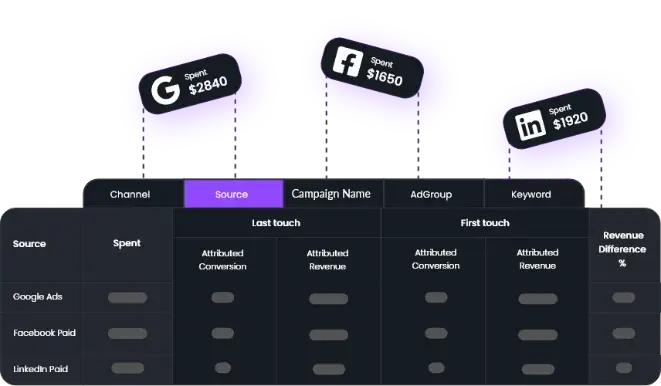
There are a plethora of attribution models available, but unlike many typical marketing attribution software solutions, DiGGrowth offers deeper pipeline visibility and advanced machine-learning-powered attribution. This robust platform offers precise marketing analytics and attribution features, guiding marketing leaders and their teams toward a revenue-focused approach. DiGGrowth’s strength lies in accurately attributing revenue and pipeline to various marketing expenditures, all through its powerful attribution tracking software, ensuring a clear and data-driven understanding of marketing performance.
Recognizing the increasing importance of combining online and offline strategies, DiGGrowth introduces ‘phygital’ insights, enabling marketers to tailor their efforts to specific target markets. It doesn’t stop at traditional attribution models; it takes you on a journey with end-to-end visualizations. This attribution software gives you a holistic view, capturing the complexity of the modern customer journey. From tracking that first anonymous touchpoint to seamlessly following known users through their interactions, DiGGrowth is designed with your understanding of the customer journey and audience in mind.
Key Features
- DiGGrowth simplifies the reporting process with its comprehensive out-of-the-box reporting capabilities.
- Marketing leaders can quickly access crucial insights, allowing for swift decision-making.
- A key strength of DiGGrowth lies in its utilization of machine learning, acting as a powerful decision engine.
- It enables marketing professionals to justify spending and make informed decisions to drive higher revenue.
- Multi-touch attribution solution offers a comprehensive view of customer interactions across all touchpoints, providing valuable insights into how each channel contributes to conversions.
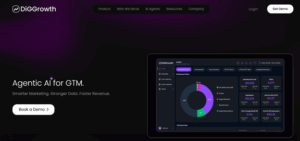
DiGGrowth’s Comprehensive Attribution Solutions for Optimized Marketing Performance
Performance Attribution Software
DiGGrowth’s performance attribution software offers a data-driven approach to accurately measure and attribute revenue across various marketing channels. It ensures that marketing efforts are aligned with revenue goals, providing clear insights into which strategies are delivering the best ROI.
Digital Marketing Attribution
DiGGrowth’s digital marketing attribution capabilities offer businesses a clear, comprehensive view of their marketing efforts. By accurately tracking each touchpoint in the customer journey, businesses can identify which channels are contributing most effectively to conversions and revenue growth. This data-driven approach ensures smarter marketing investments and better ROI.
Marketing Attribution Technology
DiGGrowth leverages advanced marketing attribution technology to provide in-depth insights into customer interactions across multiple touchpoints. The platform integrates seamlessly with existing systems, enabling businesses to track performance accurately, optimize marketing strategies, and enhance overall campaign effectiveness. This cutting-edge technology ensures precise and actionable insights for driving marketing success.
Why DiGGrowth Stands Out as Best Marketing Attribution Software?
DiGGrowth gives your business clear insights into marketing and advertising effectiveness, addressing the diverse needs of different roles within your marketing team. The software provides custom marketing dashboards and reports, enabling you to effectively measure and demonstrate the value of digital marketing performance.
The platform streamlines your marketing programs, campaign planning, and reporting, offering tailored dashboards specifically designed for your role as a marketing operations manager. DiGGrowth empowers you as a performance marketer to measure channel performance and showcase your value through holistic reports, particularly in the context of Online advertising. As a Software as a service solution, it delivers scalability and efficiency for modern marketing teams.
Pro Tip- With DiGGrowth, you can proactively enhance your marketing strategy by regularly fine-tuning attribution models through its advanced machine-learning capabilities. It also provides end-to-end user journey visualizations to identify critical touchpoints and optimize strategies precisely, ensuring a substantial impact on revenue. By utilizing multi-channel attribution tools, DiGGrowth ensures precise tracking across all marketing channels, boosting ROI.
Gain a 360-degree view of your customer journey, optimize spend, and drive higher revenue with DiGGrowth.
See How It Works—Book A Demo Now!.
Dreamdata (Popular B2B Revenue Attribution Platform)
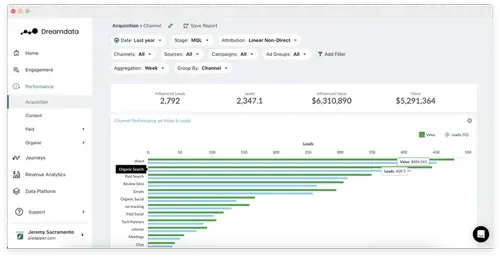
Dreamdata is a leading B2B revenue attribution platform popular for its ability to collect, integrate, and refine all revenue-related data. With Dreamdata, you gain actionable insights into the drivers of your B2B revenue.
The platform’s performance feature allows you to measure and analyze the efficiency of various revenue-generating activities to maximize effectiveness, improve ROI, and minimize waste.
Dreamdata offers comprehensive insights into customer journeys. Visualize interactive timelines for each account in your pipeline, providing a deep understanding of your sales process. This feature enables strategic decision-making and optimization of your B2B revenue strategies. Dreamdata is your key to unlocking valuable insights for driving business success, including enhancing brand awareness by understanding how different marketing efforts contribute to visibility and recognition within your target audience. Digital marketing attribution helps track and measure the impact of marketing efforts for better resource allocation.
Factors.AI (B2B Pipeline And Revenue Attribution Platform)

Another popular marketing attribution tool is Factors.AI. It gives marketers in-depth insights into the impact of sales, marketing, and e-commerce activities on pipeline and revenue. Offering robust features like campaign and content attribution, Factors.AI ensures a comprehensive view of your marketing metrics.
Campaign Attribution allows precise tracking to optimize budget allocation by quantifying return on ad spend. Its content attribution feature evaluates the impact of ungated assets, like blogs and videos, facilitating strategic adjustments. Notably, Factors.AI stands out by incorporating offline touchpoints, such as events and outreach emails, enhancing attribution modeling for a more holistic understanding of your marketing and pricing impact.
Demandbase (Account-Based Marketing And Attribution Platform)
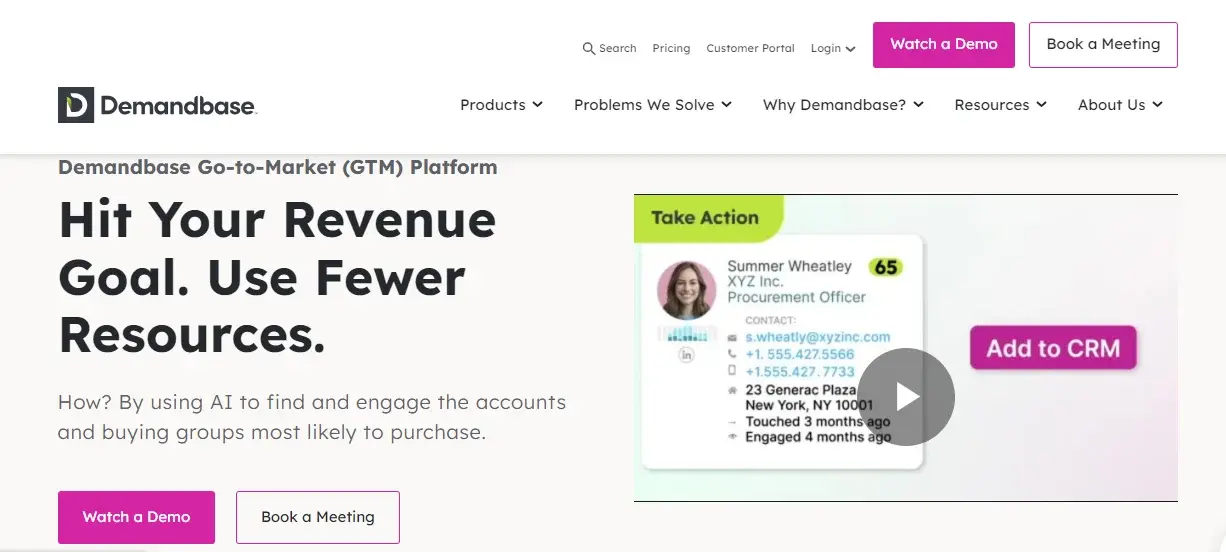
Designed for the cloud, Demandbase is a versatile platform that uses attribution insights into every step of your B2B buyer’s journey. With Demandbase as your B2B solution, you can optimize your marketing and sales pipelines as well as drive conversions through personalized content and meaningful customer engagement.
With Demandbase, evaluate the contribution of diverse marketing campaigns and sales activities. From dissecting the initial stages of the funnel to assessing the effectiveness of closing deals, it provides comprehensive insights. This marketing automation tool is your key partner in boosting your experiences and securing impactful results from your marketing and sales endeavors.
Attribution (Multi-Touch Marketing Attribution Platform)
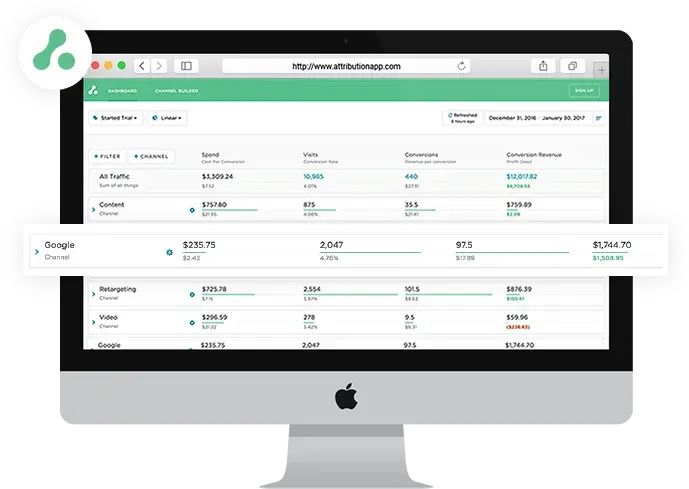
Attribution is your go-to multi-touch attribution software. This platform excels at precisely identifying the impact of marketing touchpoints in your sales funnel. It goes beyond by seamlessly integrating and analyzing every marketing touch, channel, and account in your buyer’s journey, right down to individual buyers.
Attribution goes the extra mile in user-friendliness, providing an effortless setup, an intuitive interface, advanced visualizations, and unlimited reporting flexibility. It offers data fidelity and detailed performance insights through its patented attribution engine and rules-based cohorts. This ensures precise allocation of conversions and revenue, making it a reliable choice for corporations seeking comprehensive and accurate analytics. With multi-channel attribution tools, businesses can easily track performance across all touchpoints.
Ecommerce And D2C Businesses
HubSpot (One of the Most Popular Attribution Tools)
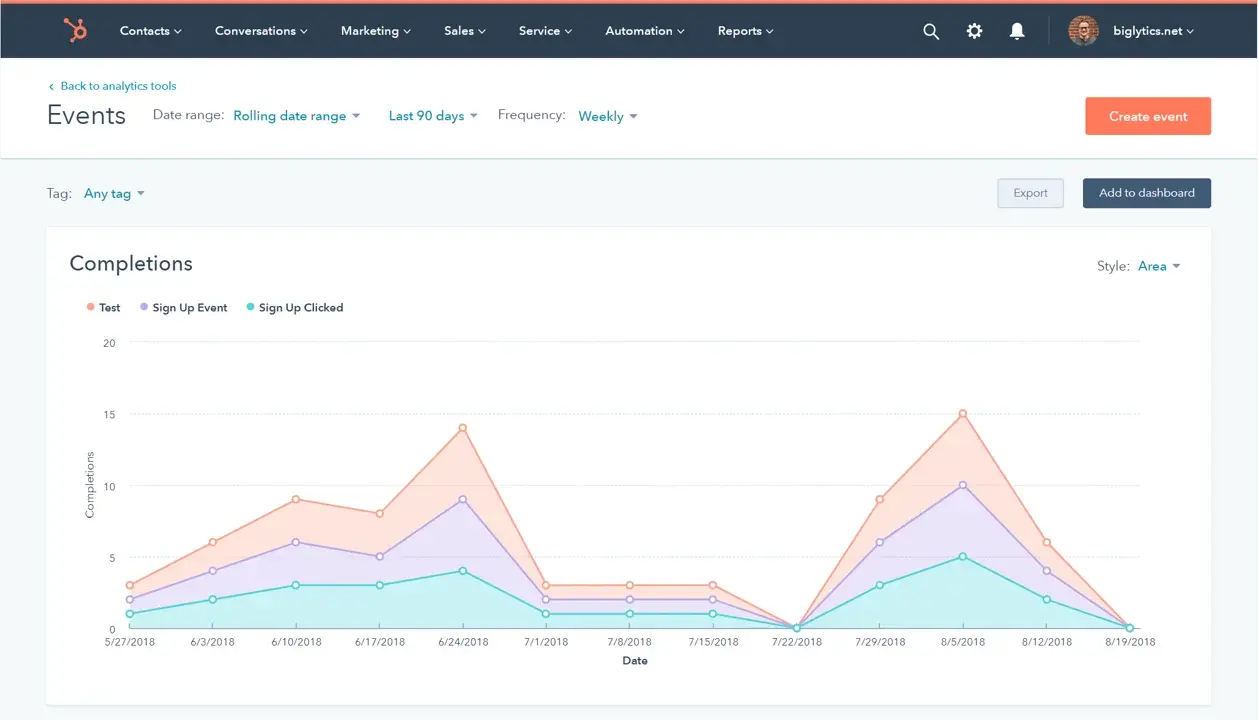
HubSpot’s Marketing Analytics and Dashboard software remains one of the popular tools in the marketing attribution category, offering built-in reporting and CRM-aligned insights.
HubSpot’s unique strength lies in seamlessly integrating CRM and marketing data, allowing businesses to accurately credit various touchpoints throughout the customer journey. The platform excels in contact attribution reporting, meticulously recording each customer interaction and associated revenue in individual contact records. This not only enhances brand awareness by ensuring that every interaction contributes to the overall corporate identity but also strengthens the company’s market presence.
Additionally, HubSpot offers revenue attribution reporting that enables businesses to identify high-performing channels and areas that require enhancement. By providing detailed insights, HubSpot fosters strategic decision-making for optimized marketing strategies and maximized revenue impact. Moreover, with its predictive analytics capabilities, HubSpot allows businesses to anticipate future trends and customer behaviors, further enhancing their marketing strategies, brand awareness, and revenue generation efforts.
Ruler Analytics (Popular Call-Tracking + Attribution Tool)
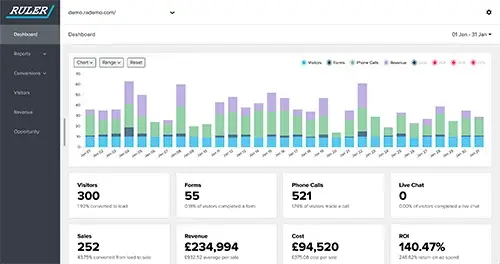
Ruler Analytics is another popular marketing attribution and call-tracking software that stands out for its closed-loop attribution system. Centralizing all revenue and conversions in a single location, Ruler tracks every anonymous website visitor.
It precisely notes customer conversions via phone calls, forms, or live chat, seamlessly pushing data to your analytics/CRM platform. Notably, Ruler Analytics goes beyond standard online interaction focus and incorporates market segmentation.
Ruler integrates with CRM systems, call tracking solutions, and diverse data sources, attributing offline interactions like phone calls and form submissions back to specific marketing campaigns. This comprehensive approach sets Ruler Analytics apart, offering unparalleled insights into the full spectrum of customer engagements.
Attribution & Marketing Data Tool
Improvado (Enterprise Data Integration And Attribution Platform)
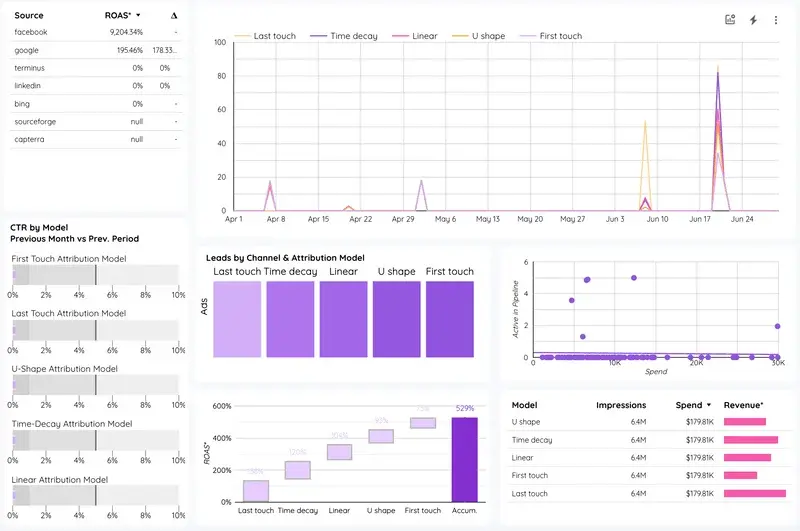
Improvado attribution is another tool you can find valuable in your marketing efforts. This platform sets itself apart by applying standard and custom attribution models to unified, normalized data sets, all while using unique customer identifiers. This approach gives you a comprehensive view of your customer journey, enabling an accurate assessment of the link between your marketing endeavors and revenue generation.
With Improvado Attribution, you can consolidate your entire digital footprint, from the first touch to the lifetime value. The platform optimally distributes value across all touchpoints, providing you with a precise understanding of how your marketing efforts impact revenue. This tool, coupled with marketing attribution services, gives you insights into specific touchpoints that contribute significantly to your overall success, empowering you to make informed decisions for your marketing strategies.
Moreover, Improvado Attribution helps you enhance customer retention by identifying the most effective strategies for retaining existing customers and fostering long-term relationships with them.
CAKE (Performance Marketing Attribution Platform)
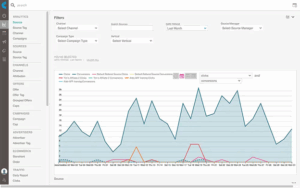
The last tool on our list is CAKE, a dynamic marketing attribution software designed specifically for performance marketers. It excels in optimizing your digital campaign performance and maximizing return on ad spend.
CAKE’s multichannel solution lets you comprehensively measure the effectiveness of your campaigns across various channels, gaining valuable insights to refine your strategies and enhance overall performance.
When it comes to marketing attribution, CAKE allows you to identify impact and strengthen channel performance, elevate overall campaign success through smart insights, and ensure data protection and privacy.
Pro Tip- With CAKE’s marketing attribution software, you can use dedicated team support to eliminate risks, handle challenges, and maintain credibility in your marketing efforts. By incorporating multi-touch attribution solutions, you can track every touchpoint across channels for more accurate insights and optimized strategies.
Implementation Complexity And Time-To-Value Comparison
| Tool | Complexity | Time-To-Value Driver |
|---|---|---|
| DiGGrowth | Medium–High | CRM maturity and attribution model depth |
| Dreamdata | Medium | CRM and account-level data quality |
| Factors.AI | Medium | Coverage of sales and marketing touchpoints |
| Demandbase | High | ABM readiness and data enrichment |
| Attribution | Medium–High | Buyer journey complexity and touchpoints |
| Ruler Analytics | Low–Medium | Channel coverage and offline tracking |
| HubSpot | Low–Medium | HubSpot setup and data hygiene |
| Improvado | High | Data unification and reporting scope |
| CAKE | Medium | Channel mix and conversion tracking |
Marketing Attribution Software: Making the Right Choice
Choosing the right marketing attribution software is essential considering the numerous options available.
To make the best choice, define your goals and identify key features. Ensure it smoothly integrates with your existing marketing tools, prioritize scalability, and look for a user-friendly interface.
Don’t overlook accuracy and customization options, and leverage trial periods for hands-on testing.
Pro Tip- During trials, engage with vendor support to assess responsiveness and expertise for long-term assistance. With these considerations, you’ll be set to use one of the many available marketing attribution tools for data-driven growth.
Marketers and C-level executives are feeling an increased demand to prove the effectiveness of their ad campaigns and marketing initiatives. For instance, 59% of marketing leaders said they face high levels of pressure from CEOs to show the impact of their efforts, according to the August 2021 CMO Survey sponsored by the American Marketing Association, Deloitte, and Duke University’s Fuqua School of Business. We believe marketing attribution has the potential to address this issue.
– martech.org
Sign Up For A 30-Day Free Trial And Take Control Of Your Marketing Performance!
Marketing Attribution Software Use Cases: How a B2B Company Improved Marketing ROI with DiGGrowth
A mid-sized B2B company struggled to identify which marketing channels were driving the highest-quality leads. Their team relied on multiple platforms, but without a clear view of customer touchpoints, budget allocation was based on assumptions rather than data. They needed a solution that could provide transparency into campaign performance and optimize their marketing strategy.
Challenges:
- Difficulty in tracking customer interactions across multiple channels
- Inefficient budget allocation due to lack of data-driven insights
- Unclear contribution of different touchpoints in the customer journey
Solution:
- The company adopted DiGGrowth’s marketing attribution technology, which provided a comprehensive view of how prospects interacted with various marketing efforts.
- By leveraging the best attribution modeling for marketing, the tool assigned precise credit to each touchpoint—whether a paid ad, email campaign, social media post, or webinar.
Results:
- Optimized Budget Allocation:
- Improved Lead Quality:
- Data-Driven Decision Making:
The company shifted its marketing spend to the highest-performing channels, reducing wasted ad spend by 30%.
By identifying the most effective touchpoints, they focused on strategies that attracted high-intent prospects, increasing conversion rates by 25%.
With real-time insights, the team could adjust campaigns on the go, improving overall marketing efficiency.
The company transformed its marketing approach by implementing DiGGrowth’s marketing attribution software, leading to higher ROI and a more effective, data-driven strategy.
Marketing Attribution Tools Challenges and Solutions
While marketing attribution tools provide valuable insights, their implementation can be challenging. Below are three common challenges businesses face and practical solutions to overcome them.
- Data Overload and Integration Issues
- Determining the Right Attribution Model
- Cross-Channel Tracking Complexity
-
Challenge:
Attribution tools gather data from multiple sources, but integrating this data into a unified model can be difficult. Inconsistent or fragmented data can lead to inaccurate insights, making it hard to trust the results.
Solution:
Invest in marketing attribution technology that seamlessly integrates with existing platforms, ensuring accurate data aggregation across channels. Regular audits of data sources can help identify and correct any inconsistencies, improving the overall quality of insights.
-
Challenge:
Choosing the best attribution modeling for marketing is crucial, but many businesses struggle to decide between models like first-touch, last-touch, or multi-touch. The wrong choice can skew the results and lead to misaligned strategies.
Solution:
Evaluate your business goals and customer journey before selecting a model. Start with a simple model (like last-touch) and gradually move to more complex models (like data-driven) as you collect more data. Using a tool that provides automated suggestions based on campaign performance can also help simplify this decision.
-
Challenge:
Customers interact with brands across various touchpoints—online and offline—making it difficult for attribution tools to track all these interactions accurately. This can lead to incomplete data and confusion over which touchpoints drive conversions.
Solution:
Use marketing attribution technology that integrates cross-channel data, including offline touchpoints like in-store visits or phone calls. Combining digital data with CRM systems can offer a more complete view of the customer journey, ensuring that every interaction is captured and credited correctly.
Marketing Attribution Software and Tools Best Practices
To maximize the value of marketing attribution software and ensure precise, actionable insights, businesses should focus on these best practices:
- Set Clear Goals and KPIs
- Before diving into marketing attribution, define clear goals and KPIs (Key Performance Indicators) that align with your business objectives. Having specific KPIs allows you to track progress and measure the impact of different channels accurately. This alignment ensures that your attribution model provides insights directly relevant to your strategy and helps make data-driven decisions that contribute to your overall success.
- Choose the Right Attribution Model
- Attribution models come in various forms—first-touch, last-touch, time-decay, and multi-touch—each reflecting different ways of assigning credit to marketing activities. Choosing the best attribution modeling for marketing based on your business goals and the customer journey is essential. For example, a first-touch model might be useful for awareness campaigns, while a multi-touch model can provide a more comprehensive view of customer interactions. Picking the wrong model can distort the true contribution of each marketing channel, affecting your decisions on where to allocate resources.
- Integrate Across Channels and Platforms
- In today’s marketing landscape, customers engage with brands across various touchpoints—email, social media, search engines, in-store visits, and more. Your attribution platform should seamlessly integrate with all relevant channels to get a complete picture of the customer journey. This ensures you capture cross-channel interactions and gain insights into how each touchpoint contributes to conversions. Without a unified view, you may miss key touchpoints or understate the influence of channels like offline interactions or emerging platforms.
- Regularly Clean and Audit Data
- Accurate data is the foundation of effective attribution. Data flows from multiple sources and can easily become fragmented, inconsistent, or duplicated. Regularly audit and clean your data to eliminate errors or discrepancies. This process ensures that your attribution software functions correctly and delivers precise insights. Poor-quality data can lead to incorrect conclusions, causing businesses to misallocate marketing budgets or miss valuable opportunities. Clean data also makes it easier to detect patterns and trends that can enhance future campaigns.
- Continuously Monitor and Optimize
- Marketing strategies, customer behaviors, and market conditions evolve. Therefore, regularly monitoring your multi-channel attribution tools’ performance is essential. Track which channels deliver the best results, identify shifts in consumer behavior, and adjust your attribution model accordingly. Incorporating factors like Search algorithm updates and relevant Index terms can enhance your analysis. Regular optimization helps you keep your marketing strategy agile and responsive, ensuring that you can improve ROI as your campaigns progress, your customer base grows, and new marketing technologies emerge.
Conclusion
As marketing becomes increasingly data-driven, the importance of accurate attribution cannot be overstated. The diverse landscape of marketing attribution software offers a range of tools, each with unique strengths. From comprehensive analytics to machine learning-driven insights, these tools empower marketers to understand customer journeys, optimize ad spend, and drive revenue. Choosing the right marketing attribution software, especially from the best marketing attribution software 2026 and features list, is crucial for obtaining precise analytics, accurate channel contribution insights, and revenue-focused decision support.
Citations
https://www.statista.com/statistics/1385322/most-measured-marketing-metrics-united-states/
https://techbootcamps.utexas.edu/blog/attribution-modeling/
https://ouci.dntb.gov.ua/en/works/9ZjyJ289/
https://www.emerald.com/insight/content/doi/10.1108/S1548-643520210000018007/full/html
Ready to boost your marketing strategies with DiGGrowth? Talk to Us!
Checkout the best Marketing Attribution Tool. Just write to us at info@diggrowth.com and we’ll get back to you.
Expand Your Knowledge
The Power of Incrementality Measurement: Driving Actionable Insights for Marketers
A Guide to Multi-Touch Attribution Models
The Ultimate Guide to B2B Marketing Attribution Software
The Backbone of Modern Marketing: Data Scientists’ Role in Attribution
Unlocking the Power of Conversion Attribution Tracking in Marketing Campaigns
Ready to get started?
Increase your marketing ROI by 30% with custom dashboards & reports that present a clear picture of marketing effectiveness
Start Free Trial
Experience Premium Marketing Analytics At Budget-Friendly Pricing.

Learn how you can accurately measure return on marketing investment.
How Predictive AI Will Transform Paid Media Strategy in 2026
Paid media isn’t a channel game anymore, it’s...
Read full post postDon’t Let AI Break Your Brand: What Every CMO Should Know
AI isn’t just another marketing tool. It’s changing...
Read full post postFrom Demos to Deployment: Why MCP Is the Foundation of Agentic AI
A quiet revolution is unfolding in AI. And...
Read full post postFAQ's
A marketing attribution tool is software that analyzes and assigns value to different touchpoints in a customer's journey, aiding businesses in optimizing marketing strategies.
Attribution in software refers to assigning credit or value to specific elements, such as features or interactions. Marketing software involves recognizing and assigning significance to various touchpoints.
The attribution method in marketing determines how credit is assigned to different touchpoints in a customer's journey, aiding strategic decision-making.
CRM attribution tracks and attributes the impact of customer relationship management (CRM) activities on marketing and sales success, offering insights for strategy optimization.
Digital marketing attribution identifies and assigns credit to marketing touchpoints that lead to conversions. It helps businesses understand channel performance, optimize strategies, and allocate resources effectively, leading to more informed decisions and better marketing ROI.
Multi-touch attribution solutions track customer interactions across various touchpoints, assigning value to each. This approach helps businesses understand how different channels contribute to conversions, enabling optimized marketing strategies, improved customer engagement, and better resource allocation.
Marketing attribution services track and analyze marketing touchpoints to provide insights into performance. They help businesses understand how channels contribute to conversions, optimize marketing strategies, improve resource allocation, and enhance overall campaign effectiveness for better results.


